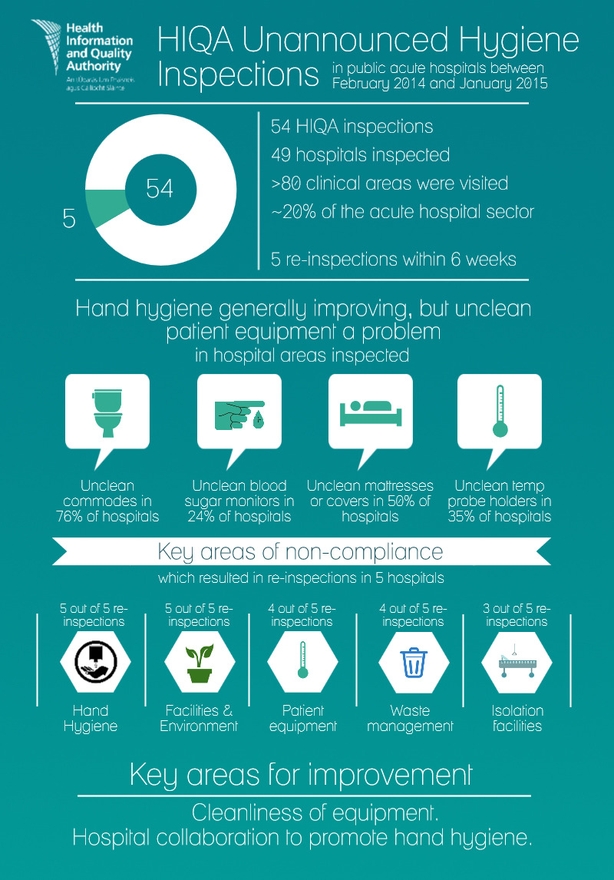Overcrowding, unsafe injection practices and poor hand hygiene are among the issues raised in a series of reports published by the Health Information and Quality Authority.
The reports for Cavan General Hospital, Mayo General Hospital, the Midland Regional Hospital, Mullingar and Wexford General Hospital contain some poor findings.
At Wexford General Hospital cramped, cluttered conditions and sub-optimal spacing between beds was identified as an issue of concern.
Forty-nine patients were being accommodated on St Joseph's Ward, after 15 additional beds were reopened, due to overcrowding in the hospital's Emergency Department.
The inspection, conducted on 5 February, found that some beds could only be accessed from one side making attending to patients' needs challenging.
In Cavan, unsafe injection practices were observed.
A number of syringes containing medicine were being stored uncovered in kidney trays, increasing the risk of contamination.
The high incidence of C difficile infection at the hospital in 2014 has shown little sign of improvement.
In Mayo General Hospital, the Oncology / Haematology Day Ward had 20 patients in two rooms, which is double the number there is space for, and increases the risk of transmission of illnesses such as influenza.
The sinks were also unclean, while the level of dust was deemed unacceptable.
At the Midland Regional Hospital, Mullingar, HIQA identified an immediate high risk regarding the transmission of infection and significant need for improvement at the Paediatric Unit.

Inspections were also carried out at Bantry General Hospital, Connolly Hospital Blanchardstown, Coombe Women's University Hospital, Mallow General Hospital, Sligo General Hospital, South Tipperary General Hospital, St Michael's Dún Laoghaire.
HIQA criticises hygiene standards at Mayo hospital
Among concerns noted at Mayo General Hospital were overcrowding, poor hand hygiene and unacceptable levels of dust.
HIQA carried out the unannounced inspection at the hospital in Castlebar on 12 March.
The Elderly Medicine Ward, the Oncology / Haematology Day Ward at Mayo General Hospital were inspected and two wards were revisited following a previous inspection.
In the Elderly Patient Ward, opportunities for improvement were identified in management of equipment.
There was no checklist for the daily cleaning of patient equipment, which did not provide assurances that the equipment is cleaned daily, in line with best practice.
This concern was also highlighted in the 2014 inspection.
Unacceptable levels of dust were observed in the patient areas, including a room used for the preparation of intravenous medications.
Hand hygiene compliance was poor in the two wards on the day of inspection, at 28.5%, and a decline in compliance was also evident at the end of 2014.
In the Elderly Ward this issue was raised in the last inspection.
In the Oncology / Haematology Day Ward, the low compliance was of concern because of the nature of the activities carried out on the ward.
HIQA has recommended that Mayo General Hospital acts to ensure that cleaning services, waste management arrangements and infection control practices are effectively managed.
High risks identified at Mullingar hospital
An unannounced inspection of the Paediatric Ward at the Midland Regional Hospital in Mullingar identified an immediate high risk regarding the transmission of infection and significant need for improvement.
HIQA carried out the unannounced inspections at the hospital on 19 February and a re-inspection on 25 March.
On the first visit to the Paediatric Unit, it observed poor signage about the precautions that should be taken when entering isolation units, poor awareness of transmission-based precautions, particularly in relation to hand hygiene, and the use of personal protective equipment.
This raised a concern for the authority that the risk of spread of transmissible infection was not being managed.
In one case, red staining was visible on the surface of a surgical tray, indicating that it had not been decontaminated prior to use, significantly increasing the risk of transmission of infectious material, including blood-borne viruses.
It was also noted that portable patient monitoring equipment was not cleaned between patient use.
A mattress, in the same unit, which had previously failed an audit, had not been replaced four months later.
The Intensive Care Unit / Coronary Care Unit was also inspected, where a number of pieces of patient equipment were deemed unclean.
Results of a hand hygiene audit showed poor compliance (50%) in the second half of 2014, while the authority observed a considerable improvement in hand hygiene compliance during the March re-inspection.
During the re-inspection in March, HIQA reported that corrective action had been implemented across the hospital; the hospital had taken steps to share the learning from the inspection process, and there was a considerable improvement in hand hygiene compliance.
Hand hygiene audits not completed in Cavan
Unsafe injection practices, no improvement in the rates of C difficile infection, and failure to complete hand hygiene audits were some of the concerns identified during an unannounced inspection at Cavan General Hospital.
It was carried out on 3 March at the Theatre Department, the Renal Dialysis Unit and the Physiotherapy Department.
Unsafe injection practices were observed during inspection of an aesthetic room.
A number of syringes containing mediation were insufficiently labeled and stored uncovered in disposable kidney trays.
Such medications should be prepared and administered immediately, a delay in doing so increase the risk of contamination. The authority has recommended that the hospital review this practice.
Two surgical units inspected in October 2014, where a high incidence of C difficile infection had been identified, were revisited.
Documentation seen during the latest visit indicated there had been little improvement in the rates.
Also of concern to HIQA was documentation that indicated that a significant number of wards were not returning or completing hand hygiene audits every week.
Its inspection report said there was considerable room for improvement in hand hygiene compliance.
Overall, the three areas inspected during the 2015 unannounced inspection were found to be clean and well maintained.
had not been conducted by the time of the latest inspection.

